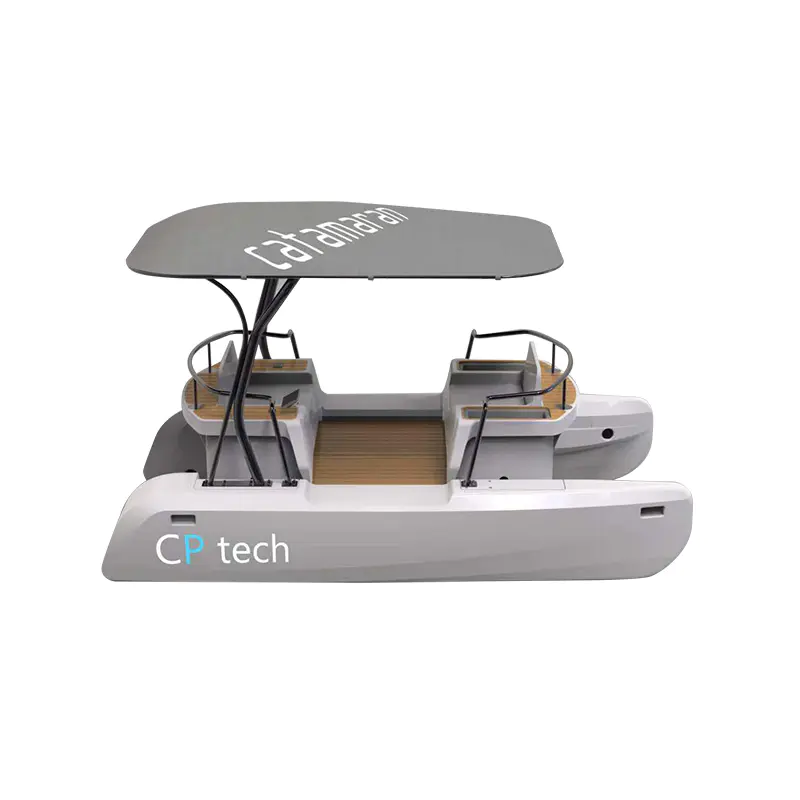Electric Pontoon Boats: A Greener and Quieter Way to Enjoy the Water
2025-04-18
An electric pontoon boat is essentially a pontoon boat—a flat-bottomed vessel with two or more pontoons for buoyancy—that is powered by an electric motor instead of a gasoline or diesel engine. Unlike their traditional counterparts, which often rely on noisy and polluting internal combustion engines, electric pontoon boats use electric propulsion systems that run on batteries, offering a much quieter and more sustainable boating experience.

The concept of electric-powered boats isn't entirely new, but advancements in battery technology and electric motors have made electric pontoon boats a viable and attractive option for recreational boaters. These boats are increasingly popular for various activities, including fishing, sightseeing, and leisurely cruises, as well as for private use in areas where noise pollution or strict environmental regulations are a concern.
The primary appeal of electric pontoon boats lies in their ability to provide an enjoyable boating experience without the environmental impact typically associated with traditional motorboats. These boats offer a number of benefits, including reduced emissions, lower operating costs, and quieter operation, all of which contribute to a more serene and eco-conscious recreational activity on the water.
Environmental Sustainability: One of the main benefits of electric pontoon boats is their reduced environmental impact. Unlike gas-powered boats, which emit harmful pollutants into the air and water, electric boats operate cleanly. They produce zero emissions, making them an environmentally friendly choice for those who want to minimize their carbon footprint and contribute to the preservation of natural waterways.
Quieter Operation: Traditional motorboats can be noisy, which can disrupt the peaceful ambiance of lakes, rivers, or coastal areas. Electric pontoon boats are known for their quiet operation, providing a serene and relaxed atmosphere for boaters and making them ideal for areas where noise reduction is important. This characteristic also makes electric pontoons appealing to wildlife enthusiasts and those who wish to observe animals in their natural habitat without disturbing them.
Low Operating Costs: Electric pontoon boats generally have lower operating costs compared to gas-powered boats. The price of electricity to charge the boat is usually less expensive than gasoline, and electric motors typically require less maintenance. With fewer moving parts than internal combustion engines, electric motors are less prone to wear and tear, which translates into lower maintenance costs over the long term.
The electric quad bike, or electric ATV (All-Terrain Vehicle), is becoming a popular alternative to traditional gas-powered quads due to its quieter operation, lower environmental impact, and ease of maintenance. Just like their gasoline counterparts, electric quads are designed for off-road travel, capable of handling rugged terrains like dirt trails, sand dunes, and forests. However, they differ in their power source and certain mechanical components. Understanding the composition of an electric quad bike is essential for anyone considering this sustainable vehicle for recreational or practical purposes.
Electric Motor: The heart of the electric quad bike is its electric motor, which replaces the internal combustion engine found in traditional ATVs. Electric motors are typically more efficient than gas engines and offer smoother acceleration and deceleration. These motors are powered by batteries and are capable of providing high torque, which is essential for navigating rough or uneven terrain. Electric motors are also much quieter than their gasoline counterparts, providing a more peaceful riding experience.
Battery System: The battery system is one of the critical components of an electric quad. It provides the power necessary for the motor to function. Many electric quads use lithium-ion (Li-ion) batteries, known for their high energy density and relatively long lifespan compared to other types of rechargeable batteries. The size and capacity of the battery can affect the range and performance of the electric quad, with larger batteries providing longer ride times before requiring a recharge. Battery management systems (BMS) are used to monitor and regulate the battery's performance, ensuring that it operates within safe parameters and its longevity.

 English
English  русский
русский  عربى
عربى 









